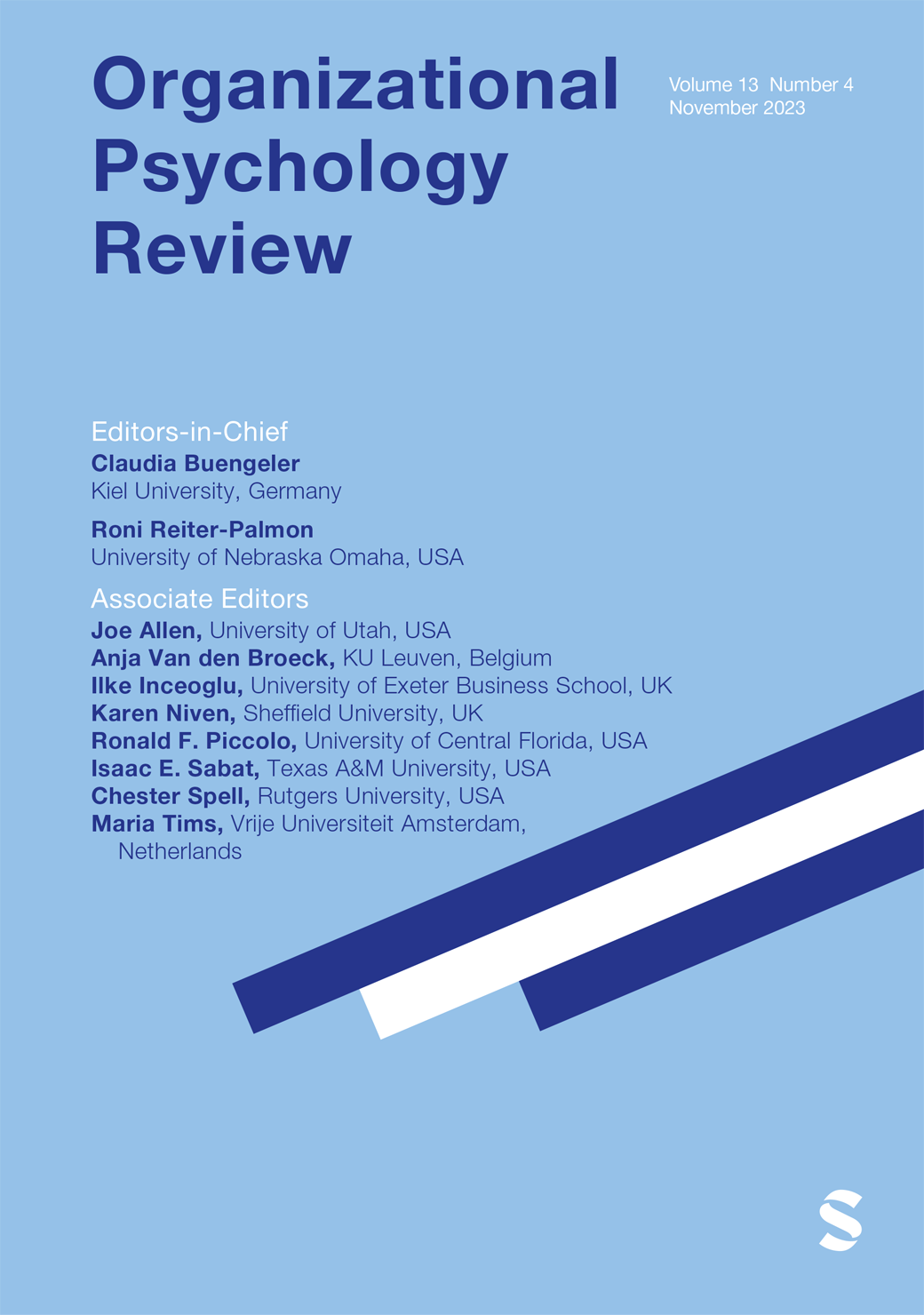认知多样性与团队创新的关系:基于资源守恒理论的团队幽默风格与团队情商的关系研究
IF 7.1
1区 心理学
Q2 MANAGEMENT
引用次数: 3
摘要
研究人员对团队认知多样性如何以及何时导致团队创新的改善或受损表现出了相当大的兴趣。在解决这一问题时,学者们采用了信息/决策和社会分类的理论视角。相反,我们在考察认知多样性和团队创新关系时借鉴了资源守恒理论。我们认为,在团队环境中,认知多样性可能会导致失去宝贵资源的威胁。这种威胁反过来又鼓励团队成员通过使用不同的幽默风格(即,附属、自我增强、攻击性、自我挫败)来补充资源。我们认为,在这种资源补充的情况下,四种团队层面的幽默风格出现了,并在认知多样性和团队创新之间起到了中介作用。此外,我们期望团队情商能够调节认知多样性和团队幽默风格之间的关系。我们的模型对团队多样性、幽默、情商和创新研究具有重要的理论意义。简明语言总结团队认知多样性可以定义为团队成员在思想、观点或价值观方面的差异程度。认知多样性对团队培养创新很重要,尽管它也可能导致关系冲突和团队中小组的形成。我们的论文将认知多样性视为一种信号,驱使团队成员使用幽默来应对多样性。这可能会导致团队使用幽默方式的不同幽默风格(即,附属、自我提升、攻击性、自我挫败)。例如,在一个认知多样的团队中工作时,团队成员可能会对工作开玩笑,让整个团队一起笑(即,附属幽默)。然而,一些成员可能会使用讽刺来侮辱其他与团体规范不同的人(即攻击性幽默)。我们认为,团队幽默风格会影响团队创新,进而将认知多样性与团队创新联系起来。此外,我们认为团队情商会影响四种团队幽默风格将认知多样性与团队创新联系起来的程度。本文章由计算机程序翻译,如有差异,请以英文原文为准。
The linkage between cognitive diversity and team innovation: Exploring the roles of team humor styles and team emotional intelligence via the conservation of resources theory
Researchers have displayed considerable interest in how and when team cognitive diversity leads to improved or impaired team innovation. When addressing this issue, scholars have adopted the information/decision making and social categorization theoretical perspectives. In contrast, we draw on conservation of resources (COR) theory when examining the cognitive diversity and team innovation relationship. We argue that in a team environment, cognitive diversity may result in the threat of losing valuable resources. This threat, in turn, encourages team members to engage in resource replenishment through the use of different humor styles (i.e., affiliative, self-enhancing, aggressive, self-defeating). We argue that, with such resource replenishment, four team-level humor styles emerge and mediate the relationship between cognitive diversity and team innovation. In addition, we expect team emotional intelligence to moderate the relationships between cognitive diversity and team humor styles. Our model has important theoretical implications for team diversity, humor, emotional intelligence, and innovation research.
Plain language summary
Team cognitive diversity can be defined as the extent to which team members differ in their ideas, perspectives, or values. Cognitive diversity is important for teams to cultivate innovation although it may also result in relationship conflicts and the formation of subgroups in a team. Our paper views cognitive diversity as a signal that drives team members to use humor to cope with diversity. This may then result in different humor styles (i.e., affiliative, self-enhancing, aggressive, self-defeating) that characterize the way the team uses humor. For instance, while working in a cognitively diverse team, team members might make a joke about work that the whole team laughs together (i.e., affiliative humor). However, some members might use sarcasm to insult others who are different from the group norms (i.e., aggressive humor). We argue that the team humor styles will influence team innovation, which in turn will link cognitive diversity with team innovation. Moreover, we suggest that team emotional intelligence will influence the extent to which the four team humor styles link cognitive diversity and team innovation.
求助全文
通过发布文献求助,成功后即可免费获取论文全文。
去求助
来源期刊

Organizational Psychology Review
Multiple-
CiteScore
10.00
自引率
1.60%
发文量
25
期刊介绍:
Organizational Psychology Review is a quarterly, peer-reviewed scholarly journal published by SAGE in partnership with the European Association of Work and Organizational Psychology. Organizational Psychology Review’s unique aim is to publish original conceptual work and meta-analyses in the field of organizational psychology (broadly defined to include applied psychology, industrial psychology, occupational psychology, organizational behavior, personnel psychology, and work psychology).Articles accepted for publication in Organizational Psychology Review will have the potential to have a major impact on research and practice in organizational psychology. They will offer analyses worth citing, worth following up on in primary research, and worth considering as a basis for applied managerial practice. As such, these should be contributions that move beyond straight forward reviews of the existing literature by developing new theory and insights. At the same time, however, they should be well-grounded in the state of the art and the empirical knowledge base, providing a good mix of a firm empirical and theoretical basis and exciting new ideas.
 求助内容:
求助内容: 应助结果提醒方式:
应助结果提醒方式:


